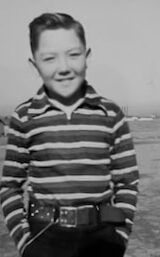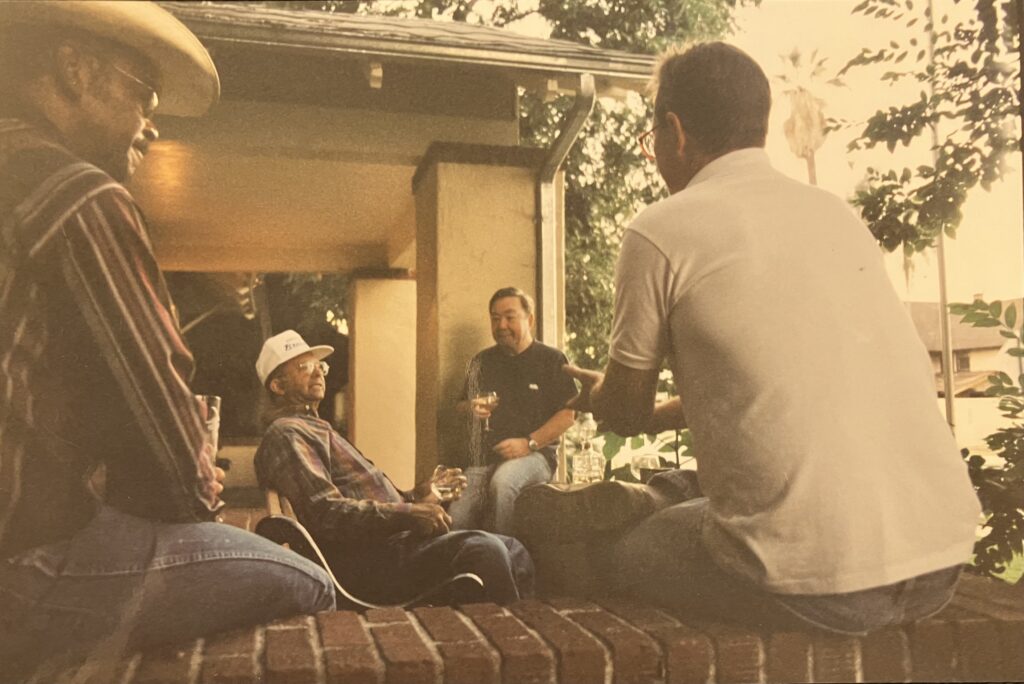My friend Wally
Posted on | February 22, 2024 | 3 Comments

I’d been gone from West Adams for twelve years, and California for eight, when last December an old friend, Karen Haas, reached out from Los Angeles to say that our neighbor and dearest of friends, Walter Matsuura, had died at at home. In an unrepayable act of kindness, Karen then suggested and artfully edited this remembrance, which she read at Wally’s memorial service last week.
If you’d said to me in London that when I moved to Los Angeles, the person closest to me would be a retired Republican cop, I would have declared it impossible. But when I moved next door to Wally in 1998, he became family.
Our ritual of meeting for Sunday evening martinis began early on. We would sit in my kitchen tipsily plotting to get Wally’s lodger Bobby to stop drinking, which for a Halcyon era that followed, Bobby did. That Sunday ritual, Wally’s and mine, lasted maybe six years, long enough that when I was garden-writing for the Times, and the Hancock Park Garden club came a-snooping, the most remarked-upon feature was the dead tree strung with our empty Bombay Sapphire Blue gin bottles. At some point, one I’ve since learned comes to all of us, Wally gave up drinking spirits, and we retired our martini glasses.
Wally was a rescuer. For a while, everyone I knew had a dog that had somehow come through Wally. Karen and Paul had Martha, Michael and Robin had Tuck, Charlie got Molly, David and Flora took Myrtle, I got Glancey and Clunk. One night, he woke me up to climb into a back-alley dumpster to rescue a baby possum. From this, I learned you should never climb in a dumpster with a possum. Another time, we dognapped a dying animal that had been chained to a tree and drove it to the Pasadena Humane Society.
Old timers will remember that Wally was dapper, and often fragrant. Was it Old Spice? If a film crew was on the block, he would wear a silken bomber jacket and even fire up walkie talkies to stay in touch with Bobby. He was El Cholo royalty and dressed up to go to Ralph’s. In the heyday of the Beverly Hills Hotel, our Wally was plucked out of the queue for the Polo Lounge by its legendary manager Nino Osti purely because Wally was so polite and at the same time uniquely aglow with his signature bon viveurship.

When friends would visit from England, Wally and Bobby would take us downtown on tours of the then quite new and dazzling Japanese American National Museum, where Wally’s father’s baseball jersey may still be on display. Here he would tell us about how he and his family, along with so many Pacific-coast dwelling Japanese Americans, were sent to Internment camps during World War II. (The photo, left, found in his home by his close friend and caretaker Karin McGaughey, is of Wally as a child in a camp in Colorado.) Wally used to joke that his family only got to keep the house next to where I’d moved because one of his grandmothers was German. He wore his patriotism on his front lawn. The American flag that Wally reverently raised and lowered every day sat at half-staff every December 7th, the anniversary of the attack on Pearl Harbor.
Like his father, Wally served in the American military. I’m reminded that it was the Army Artillery Clerical Group. I remember him joking that when he was stationed in the Pacific Northwest, his job was seeking out ABC stores for the brass.
We didn’t talk much about his cop years, though one of the retired policemen who came through as a frequent houseguest told me that when Wally worked dispatch, he was famous for never logging off until he knew everyone on patrol was safe. You could get a contact hangover off the poker room next to Wally’s kitchen, which served as the Parker Center’s mancave. Legend had it Wally’s cop parties required black and whites to be posted at Gramercy and Cimarron to “keep out the wives.”
Wally rarely looked it, but he was tough. Just ask the burglar who climbed into Wally’s dining room one night and who Wally invited to climb back out.
Wally managed to keep profound relationships with his Black neighbors while serving on a notoriously racist police force. As it seemed to me, he did this two ways. First, compartmentalization. Second, he grew. His neighbors became his squad and their safety, prosperity, and happiness became his life. What Wally proved to me is that diversity is kind people living cheek by jowl and doing the best they can. It’s not always easy or pretty but it’s love – the secret sauce of citizenship.
Most afternoons Roy from up the street, Amos from across it, and Bill from the apartments around back would gather on Wally’s porch to visit and down a bottle of Two Buck Chuck. Before there were Ring doorbells, there were these guys. Who was that kid on the bike casing their houses? Who could possibly need five visits from a fruit truck in one day?

It wasn’t the city that daubed out gang graffiti on the Gramercy freeway overpass that kept appearing in the volleying skirmishes between West Adams and Jefferson Park, but Wally, who would refresh his brush in a huge vat of paint held in a stroller pulled by Roy. At Christmas, the paint in the stroller would be replaced by an industrial-sized roll of tin foil, and a heaving supply of red ribbons, which they would use to bedazzle the palm trunks with what looked like tinselly cummerbunds. The message? Wally and Roy to the World: We care.
Oh, the flurry of housekeeping that went on as Wally and Bobby pulled out the family silver and china for the Marie Callender pies and Chock full ‘o Nuts coffee served at block club. Nothing was too good for his neighbors. Here we got to behold the glory that is Shirley Cooper, Roy’s wife, who helped run what were called meetings but were in fact parties, from which the entire neighborhood would emerge on weeknights, later than anyone planned, laughing and joshing and absolutely jacked on sugar and caffeine.
I moved a number of times before living next door to Wally, and have moved a number of times since. But nowhere impacted me like the 12 years in West Adams, and no person like Wally Matsuura. The citizenship he modeled, the love he lavished on his neighbors and friends, I carry those with me. I carry them in my heart.
Comments
3 Responses to “My friend Wally”
Leave a Reply



February 24th, 2024 @ 11:34 am
One thing left out here was Wally’s role as a West Adams historian. When Emily mentioned to him that she worked for the Los Angeles Times food section, he reportedly said “You must know Charles Perry. He’s one of ours.” Because my grandmother lived at 2227 W. 24th from 1913 to 1920 and 2383 W. 23rd from 1921 to 1936. Wow.
February 24th, 2024 @ 11:43 am
He did indeed say that. And he knew your grandmother’s academic history, which to your astonishment, I recited back to you one of my early days at work at the LAT. Wally was the one who drove me downtown for the interview, funnily enough.
February 24th, 2024 @ 8:11 pm
Thanks for a great story and tribute to Wally. We will be drinking martinis tonight to honor you both.
Hope all is well and we are loving your articles and stories. So happy to see you sharing on your blog. Hugs and love.